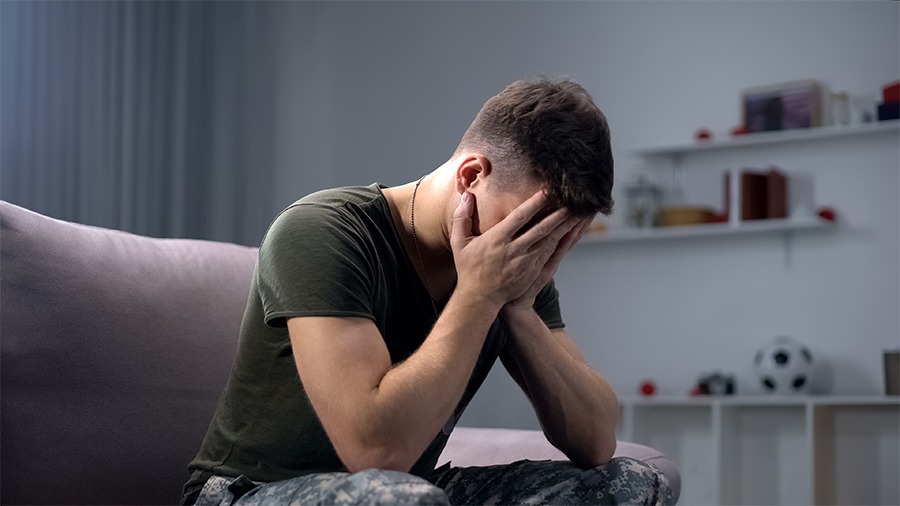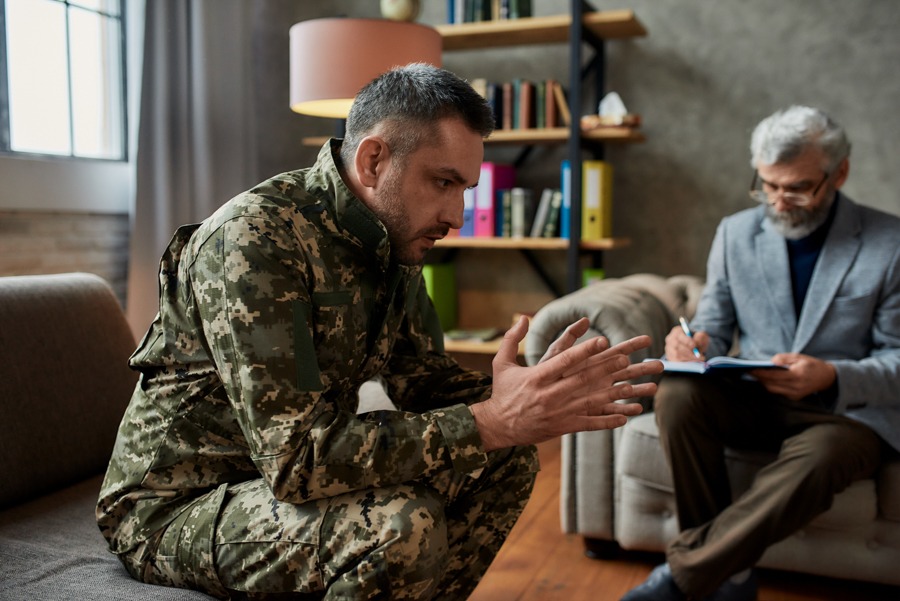The effects of Post-Traumatic Stress Disorder (PTSD), reach far beyond just the person who is suffering from the condition. PTSD can also have a profound effect on those closest to the person as well including friends, family members, co-workers, and other loved ones.
For those loved ones who may live in the same house as the person suffering from PTSD, one particularly challenging aspect of the condition is the sleep disturbances PTSD often causes, specifically night terrors.
If you have a loved one who suffers from PTSD and experiences PTSD night terrors, this blog is for you. Keep reading to learn more about why PTSD can disrupt sleep as well as ways you can help and support your loved one who may be experiencing PTSD-induced night terrors.
What Is Post-Traumatic Stress Disorder?
Jump to Section
Before we get into PTSD-related night terrors, let’s take a quick moment to talk a little bit about PTSD and what it is.
Post-Traumatic Stress Disorder is a mental health condition triggered by experiencing or witnessing a traumatic event. This traumatic event can be a natural disaster, a serious accident, abuse or assault of some sort, or exposure to combat. While PTSD can affect anyone, as you may imagine, it tends to affect those in the military as well as first responders at a disproportionately high rate.
Some common symptoms of PTSD include:
- Having intrusive memories
- Heightened arousal
- Mood changes
- Avoidance
Depending on the severity of a person’s PTSD, the condition may affect their ability to go about their daily life in a normal fashion, putting strain on their relationships and impacting their overall well-being.
How PTSD Affects Sleep?
Another common side effect of PTSD is changes in the person’s sleep patterns. The intrusive memories and the hyperarousal can lead to sleep-related issues such as insomnia, nightmares, and even night terrors.
These sleep disturbances not only disrupt the person’s rest but also exacerbate the symptoms associated with PTSD, creating a vicious cycle of not only poor mental health and well-being but also inadequate sleep.
What Are Night Terrors?
So, what exactly are night terrors?
Well, also known as sleep terrors, night terrors are what’s known as parasomnia. Parasomnia is an abnormal behavior during sleep. What sets night terrors apart from more traditional nightmares is that, while nightmares occur during the REM stage of sleep, night terrors happen during non-REM sleep.
Signs and Symptoms of Night Terrors
During a night terror episode, a person may experience any of the following:
- Intense fear or agitation
- Heavy breathing
- Sweating
- Elevated heart rate
- Screaming or shouting
- Difficult being woken or consoled
- Confusion or disorientation upon waking up
- Not being able to remember the night terror
- Trashing or violent movements
What Is the Difference Between Night Terrors and Nightmares?
One of the biggest differences between night terrors and nightmares is when they occur during the sleep cycle. While nightmares occur during deeper REM sleep, night terrors occur during non-REM sleep periods.
Another major difference is how a person behaves after having a night terror vs a nightmare. Someone having a nightmare tends to remember their dream after waking up. They may even be able to describe the nightmare in extreme detail. Night terrors, on the other hand, often come with amnesia, meaning that when someone wakes up from a night terror they often have no recollection of it even happening, leaving them confused or disoriented.
Nightmares often tend to be more “calm” from a physical standpoint too. Night terrors often involve screaming, thrashing, or other physical actions while nightmares rarely involve any physical activity on their own.
What Is the Connection Between Night Terrors and PTSD?
The connection between night terrors and PTSD comes down to the brain’s response to the trauma that caused the PTSD initially. Since PTSD disrupts the brain’s ability to regulate emotions and process memories, the combination of side effects, such as fragmented sleep patterns and hyperarousal can create a perfect storm of sorts for night terrors.
Additionally, unresolved trauma and stress can exacerbate these episodes. Night terrors may reflect the brain’s attempts to process trauma but in a disorganized and distressing way. For individuals with PTSD, the emotional intensity of their trauma memories may be so overwhelming that even non-conscious processing during sleep leads to extreme reactions. This connection underscores the importance of addressing both the psychological and physiological components of PTSD.
Environmental factors can also play a role. Loud noises, poor sleep habits, or disruptions in routine may act as triggers for night terrors in those already predisposed due to PTSD.
What Are Examples Of Night Terrors in Adults with PTSD?
PTSD night terrors are often directly related to the event or events that led to the development of PTSD initially, meaning that the night terrors will often either involve or be an exact recreation of the initial event or events.
While everyone may experience night terrors differently, here are some common examples of what a PTSD-related night terror may look like:
Emotional distress
Crying, yelling, or expressing fear during the episode
Combat-related themes
Veterans may re-enact distressing battle scenarios, complete with shouting commands or taking defensive postures
Physical reactions
Thrashing, hitting, or attempting to flee from perceived threats.
How to Cope with PTSD-Induced Night Terrors?
While PTSD-induced night terrors are scary for the person experiencing them, they can also be scary for those living with the person as well. After all, a loved one is going through something very intense.
If you have a loved one who is experiencing PTSD night terrors, there are several things you can do to help such as:
Create a Safe Sleep Environment
Make sure there is nothing in the room that could cause any harm to either the person or others. Remove all sharp or dangerous objects and use soft bedding and cushions to further reduce the risk of injury.
Avoid Triggers
Help identify and minimize exposure to triggers that may worsen PTSD symptoms, such as violent media or stressful situations.
Establish a Bedtime Routine
Encourage relaxing activities before bed, such as reading, meditating, or listening to calming music. Creating and adhering to a consistent sleep schedule can also help regulate the body’s internal clock.
Don’t Wake Them Up
While your instincts may want to wake them up to end their night terror, doing so can lead to confusion and aggression. Instead of waking them up, try and gently guide them back to a calm state.
Offer Reassurance
During or after an episode, remain calm and provide comfort, while remembering not to wake them up. Use soothing words and gentle touches to help them feel secure.
Encourage Professional Help
A mental health professional can provide therapies or trauma-focused interventions to address the root causes of PTSD and night terrors.
Practice Self-Care
Finally, make sure you are taking care of yourself as well. To properly help your loved one, you have to make sure your overall well-being is in a good state as well.
What Are Treatment Options For PTSD and Night Terrors?
Speaking of professional help, it’s important to remember that both PTSD and PTSD-related nightmares are treatable conditions.
Like many types of mental health conditions, PTSD can be treated using a combination of therapy, medication, and other practices.
Common treatment options include:
Trauma-Focused Therapies
Approaches like Eye Movement Desensitization and Reprocessing (EMDR) or Prolonged Exposure Therapy help individuals process traumatic memories and reduce their emotional impact.
Medication
Antidepressants, anti-anxiety medications, or prazosin (commonly used to reduce nightmares) may be prescribed to manage symptoms.
CBT-I
This specialized form of Cognitive Behavioral Therapy addresses sleep-related issues and helps rebuild healthy sleep patterns.
Relaxation Techniques
Mindfulness, yoga, and deep breathing exercises can promote relaxation and improve sleep quality.
Sleep Studies
A sleep study may be recommended to rule out other underlying conditions, such as sleep apnea, that could contribute to night terrors.
Support Groups
Connecting with others who have similar experiences can provide emotional support and practical advice.
Free by the Sea Offers Treatment For PTSD Night Terrors
At Free by the Sea, we understand the profound impact PTSD and night terrors can have not just on the person suffering, but their families and loved ones as well. That’s why we offer treatment programs designed to help both the person suffering from PTSD as well as their family members and loved ones through family education and support programs.
If you or a loved one are struggling with PTSD and night terrors, don’t wait to seek help. Contact us today to learn more about our comprehensive treatment options.

Dr. Richard Crabbe joined our team in 2019 as our psychiatrist and medical director. He attended the University of Ghana Medical School where he became a Medical Doctor in 1977. From 1978 through 1984, he was a medical officer in the Ghana Navy and provided a variety of services from general medicine to surgeries. He received his Certificate in General Psychology from the American Board of Psychology and Neurology in 2002.

 January 23rd, 2025
January 23rd, 2025












